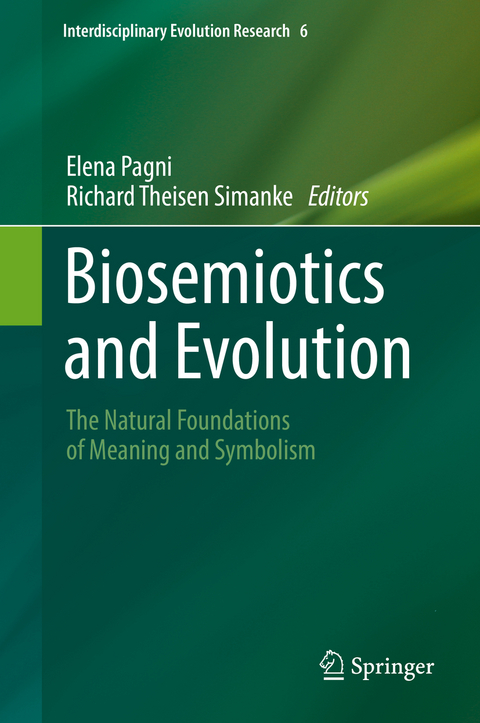
Biosemiotics and Evolution
Springer International Publishing (Verlag)
978-3-030-85264-1 (ISBN)
This book reviews the evolution of Biosemiotics and gives an outlook on the future of this interdisciplinary new discipline. In this volume, the foundations of symbolism are transformed into a phenomenological, technological, philosophical and psychological discussion enriching the readers' knowledge of these foundations. It offers the opportunity to rethink the impact that evolution theory and the confirmations about evolution as a historical and natural fact, has had and continues to have today.
The book is divided into three parts:
- Part I Life, Meaning, and Information
- Part II Semiosis and Evolution
- Part III Physics, medicine, and bioenergetics
It starts by laying out a general historical, philosophical, and scientific framework for the collection of studies that will follow. In the following some of the main reference models of evolutionary theories are revisited: Extended Synthesis, Formal Darwinismand Biosemiotics.
The authors shed new light on how to rethink the processes underlying the origins and evolution of knowledge, the boundary between teleonomic and teleological paradigms of evolution and their possible integration, the relationship between linguistics and biological sciences, especially with reference to the concept of causality, biological information and the mechanisms of its transmission, the difference between physical and biosemiotic intentionality, as well as an examination of the results offered or deriving from the application in the economics and the engineering of design, of biosemiotic models for the transmission of culture, digitalization and proto-design.
This volume is of fundamental scientific and philosophical interest, and seen as a possibility for a dialogue based on theoretical and methodological pluralism. The international nature of the publication, with contributions from all over the world, will allow a further development of academic relations, at the service of the international scientific and humanistic heritage.Elena Pagni graduated in Philosophy (University of Pisa - Italy) with a thesis on Aristotle and his view of perception, and was awarded a PhD in Philosophy from the University of Florence. She has been member of the Research Laboratory "Epistemologica" (University of Firenze, Italy), directed by Prof. Roberta Lanfredini, did a post doc scholarship at the PPG in Psychology at the Federal University of Juiz de Fora (scholarship of the PNPD/Capes Program) under the direction of Prof. Richard Simanke, and a post doc at the Faculdade de Filosofia, Ciencias e Letras de Ribeirao Preto, Departamento de Psicologia, Brazil, under the direction of Prof. Reinaldo Furlan. Since February 2018 she is a visiting professor, with exclusive dedication, at the Department of Philosophy of the Institute of Human Sciences at the Federal University of Juiz De Fora. Research fields: Ancient Philosophy, Phenomenology, Biosemiotics, evolutionary processes of biological in-formation, biological time, ontogenesis and phenotypic individuation in contemporary life sciences. Richard Theisen Simanke graduated in Philosophy and Methodology of Science from the Federal University of Sao Carlos (Brazil) and was awarded a Ph.D. in Philosophy from the State University of Sao Paulo (Brazil). He was Professor of History and Philosophy of Psychoanalysis in the Department of Philosophy and Methodology of Science at the Federal University of Sao Carlos, Brazil until 2012 and is currently Professor of History and Philosophy of Psychology in the Department of Psychology at the Federal University of Juiz de Fora, Brazil. His fields of expertise are the history and philosophy of psychoanalysis, history and philosophy of psychology, history and philosophy of science, and science and phenomenology. His secondary research interests are philosophy of biology, history and philosophy of psychiatry and the history of sexuality.
Introduction.- Part I: Life, meaning, and information.- Exploring the philosophical background and scientific foundations of naturalist approaches to meaning and symbolism.- Life sciences and the natural history of signs: can the origin of life processes coincide with the emergence of semiosis?.- A proposal for a biosemiotic approach to digitalization: literacy as modelling competence.- Threshold, meaning and life.- How information gets its meaning.- Part II: Semiosis and evolution.- Inclusive Fitness teleology and Darwinian explanatory pluralism: a theoretical sketch and an application to current controversies.- The origins and evolution of design: a stage-based model.- Biosemiotics and applied evolutionary epistemology: a comparison.- Extended synthesis and Jablonka and Lamb's four-dimensional view of evolution.- Part III: Physics, medicine, and bioenergetics.- Physical intentionality: the phenomenological roots of biosemiotics.- Cancer and cell death: a biosemiotic perspective.- Biosemiotics and bioenergetics: two perspectives compared.
| Erscheinungsdatum | 06.01.2022 |
|---|---|
| Reihe/Serie | Interdisciplinary Evolution Research |
| Zusatzinfo | XIX, 268 p. 8 illus., 6 illus. in color. |
| Verlagsort | Cham |
| Sprache | englisch |
| Maße | 155 x 235 mm |
| Gewicht | 546 g |
| Themenwelt | Geisteswissenschaften ► Philosophie ► Erkenntnistheorie / Wissenschaftstheorie |
| Naturwissenschaften ► Biologie ► Evolution | |
| Sozialwissenschaften | |
| Schlagworte | archaeology of bioinformation • biological intentionality • Biosemiotics • bodily mimesis • Ecosemiotics • Evolution • Evolutionary epistemology • Evolution theory • Extended Synthesis • fitness teleology • Formal Darwinism • Modern Synthesis • Naturalism • neo-Darwinism • Physical Intentionality • proto-design • Semiosis • semiotics & bioinformatics • Symbolism |
| ISBN-10 | 3-030-85264-4 / 3030852644 |
| ISBN-13 | 978-3-030-85264-1 / 9783030852641 |
| Zustand | Neuware |
| Informationen gemäß Produktsicherheitsverordnung (GPSR) | |
| Haben Sie eine Frage zum Produkt? |
aus dem Bereich

![Was heißt Denken?. Vorlesung Wintersemester 1951/52. [Was bedeutet das alles?] - Martin Heidegger](/media/113619842)
